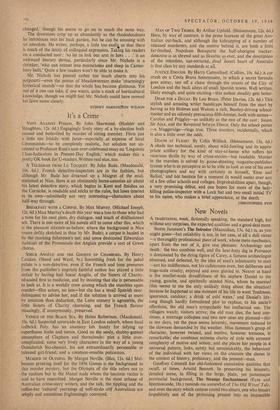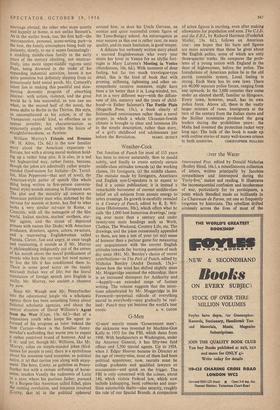New Novels
A TRADITIONAL week, fictionally speaking; the standard high, but without any surprises, the expected qualities and a good deal more.
Storm Jameson's The Intruder (Macmillan, 13s. 6d.) is, as you might guess—but reliability is not, in her case, at all a dull virtue —a thoroughly professional piece of work, whose mere mechanics, apart from the rest of it, give one pleasure. Archaeology and death: the two combine well, and the heat-hazy dig in Provence is dominated by the dying figure of Carey, a famous archeologist obsessed, and defeated, by the idea of man's inhumanity to man —not his indifference, not his callousness even, but deliberate and huge-scale cruelty, enjoyed and even gloried in. Nearer at hand is the smaller-scale dreadfulness of his nephew Daniel to the young, gauche, and spiritually stunted Nina, whom he married (this seems to me the only unlikely thing about the situation) because he happened at one moment of his life to want 'freshness, ignorance, candour; a drink of cold water,' and Daniel's life- long though hardly formulated plot to replace, in his uncle's affections, the old man's sympathetic but ineffectual son. The villagers watch; visitors arrive; the old man dies, the heat con- tinues, a marriage collapses and two new ones are planned—this in ten days, yet the pace seems leisurely, movement reduced to the slowness demanded by the weather. Miss Jameson's grasp of character, however twisted, and motive, however tortuous, is remarkable; she combines extreme clarity of style with extreme complexity of motive and action; and she places her people in a universal pattern, links, subtly but unmistakably, the behaviour of the individual with her views on the creature she shows in the context of history, prehistory, and the present—man.
Geoffrey Cotterell has old-fashioned cumulative qualities that recall, at times, Arnold Bennett. In presenting his leisurely, detailed scene, in filling in the large, plain, yet picturesque provincial background, The Strange Enchantment (Eyre and Spottiswoode, 18s.) reminds me somewhat of The Old Wives' Tale. and even the story which centres round two sisters, one who breaks impulsively out of the promising present into an impossible
marriage abroad, the other who stops quietly and happily at home, is not unlike Bennett's. As in the earlier book, too, the first half—the restrospective, personal, scene-setting part—is the best, the family atmosphere being built up patiently, slowly, to me it seems fascinatingly: a middling middle-class family in the early years of the century climbing, not unattrac- tively, into more upper-middle regions until Papa, being drowned in the midst of his expanding industrial activities, leaves it not quite penniless but definitely slipping from its precariously held social perch. Mr. Cotterell's talent lies in making this peaceful and slow- moving domestic progress of absorbing interest: with action, violence, and the great world he is less successful, as you can see when, in the second half of the novel, the scene shifts to Berlin in the Thirties. His style, as uncomplicated as his action, is of the 'transparent varnish' kind, so effortless as to appear invisible; his characterisation as apparently simple and, within the limits of straightforwardness, as flawless.
William Murray's Friends and Romans (W. H. Allen, 12s. 6d.) is the now familiar story about the American expatriate in Europe, but with a strong moral skeleton hold- ing up a rather limp plot. It is also, in a sad but highspirited way, rather funny, because, though the jokes are admittedly rather simple- minded (food-names for Italians—Dr. Tortel- lini, Miss Pepperoni—that sort of level), the American-style patter of speech (the whole thing being written in first-person conversa- tional style) sounds amusing to European ears. The plot and the morality all concern an American publicity man who, sickened by the rat-race for success at home, has fled to what looks a very similar rat-race in Rome, at Cinecitta.; with all the menagerie of the film world, Italian starlets, -starlets' mothers, star- lets' agents, and the circus of depraved princes with names like Dodo; with American producers, directors, agents, actors, ex-actors, and a man-eating Englishwoman called Pamela. Clever, fast and angry, at once tough and ruminating, it sounds as if Mr. Murray is philosophising indignantly out of the corner of his mouth about the moral predicament of People who hate the rat-race but need money to live the life it has conditioned them to. There is some good satire on the (easily satirised) Italian way of life; but the literal translation of foreign speech into English is really, Mr. Murray, too ancient a chestnut by now.
Since Mr. Waugh sent Mr. Pennyfeather into the educational jungle via a scholastic agency there has been something funny about fictional scholastic agencies, and about the central situation of David Williams's Agent from the West (Cape, 13s. 6d.)—that of a loquacious youth who keeps his agent in- formed of his progress as tutor behind the Iron Curtain—there is the familiar funny- novelist's scaffolding that warns you to expect a rather contrived brand of humour. And so it is: and yet, though Mr. Williams, like Mr. Murray, relies on simple-minded jokes (bird- names for people is one), there is a spriteliness about his nonsense (and nonsense, as political satire, it is) that carries you along with enjoy- ment. The hero, Corny, as guileless as Penny- feather but with a certain stiffening of horse- sense, teaches Vassily the rudiments of Latin in a cave where his partisan father, pursued by a Burgess-like American called Ethel, plots the coming revolution, and becomes involved (Corny, that is) in the political upheaval around him; as does his Uncle Gervase, an outsize and quite successful comic figure of the Tono-Bungay school. An extravaganza as near success as this one is rather rare; its main quality, and its main limitation, is good temper. A delicate but verbosely written story about a married Englishwoman who every year meets her lover in Venice for an idyllic fort- night is Mary Lutyens's Meeting. in Venice (Hutchinson, 10s. 6d.). With moments of deep feeling, but far too much travelogue-type detail, this is the kind of book that with pruning, stiffening, tightening and other un- sympathetic curative measures, might have been a lot better than it is. Long-winded, too, but in a very different way—with the diffuse- ness of life, memory and the years of child- hood—is Esther Salaman's The Fertile Plain (Hogarth Press, 15s.), a book clearly of fictionalised reminiscence rather than a novel proper, in which a whole Ukranian-Jewish climate is brought to clear and luminous life in the simple description, rather than story, of a girl's childhood and adolescence just before the Revolution. ISABEL QUIGLY



































 Previous page
Previous page